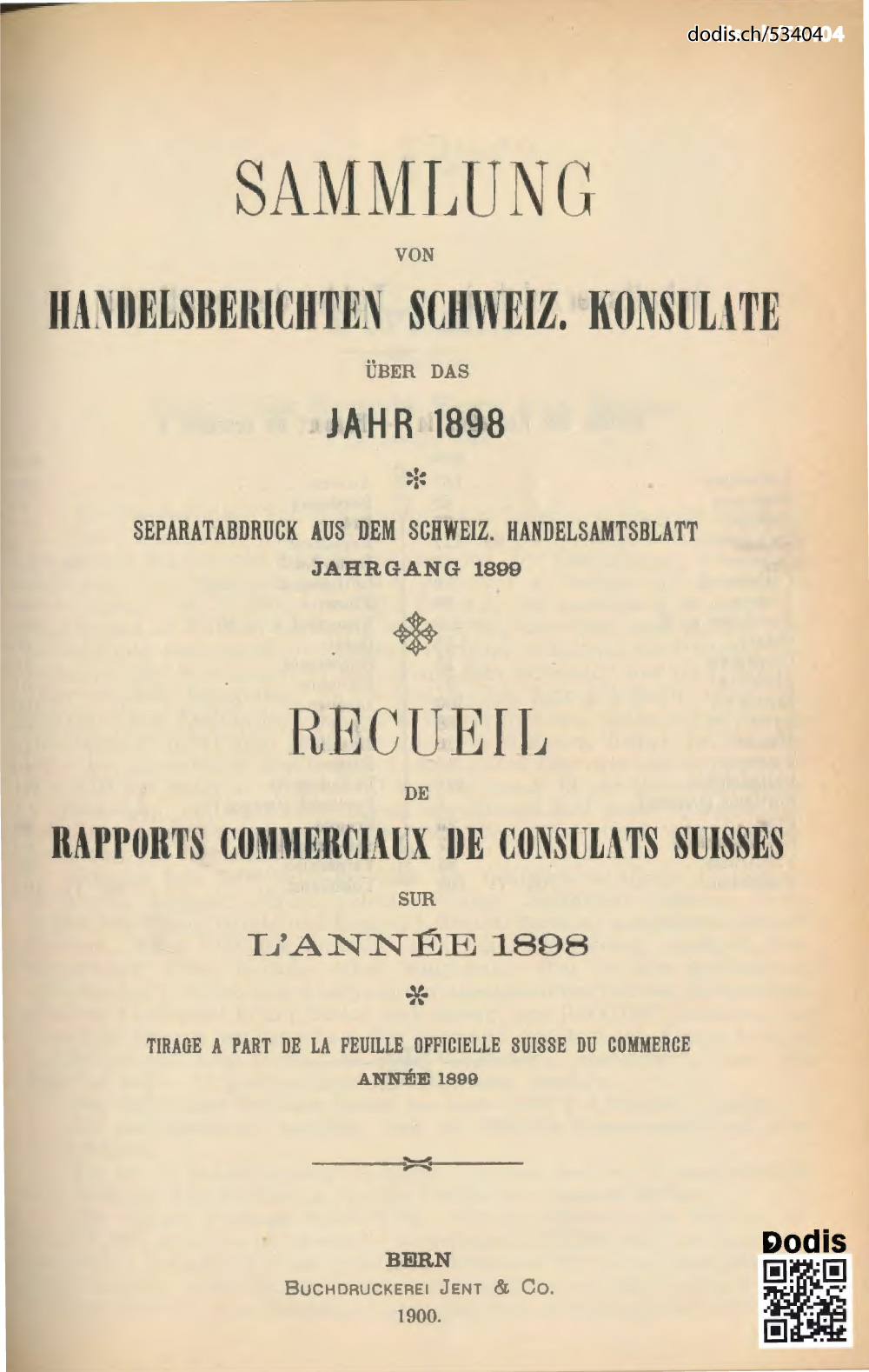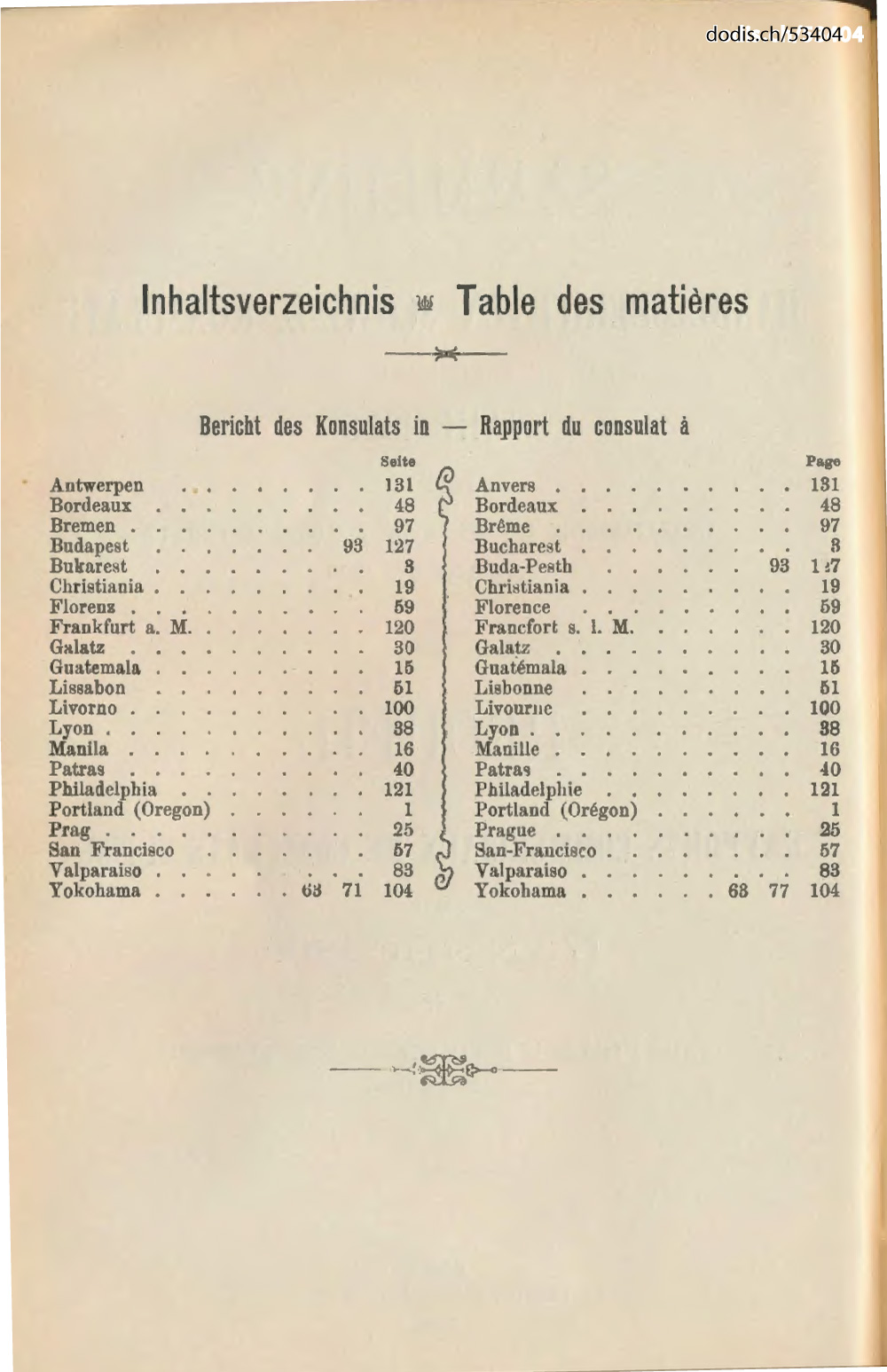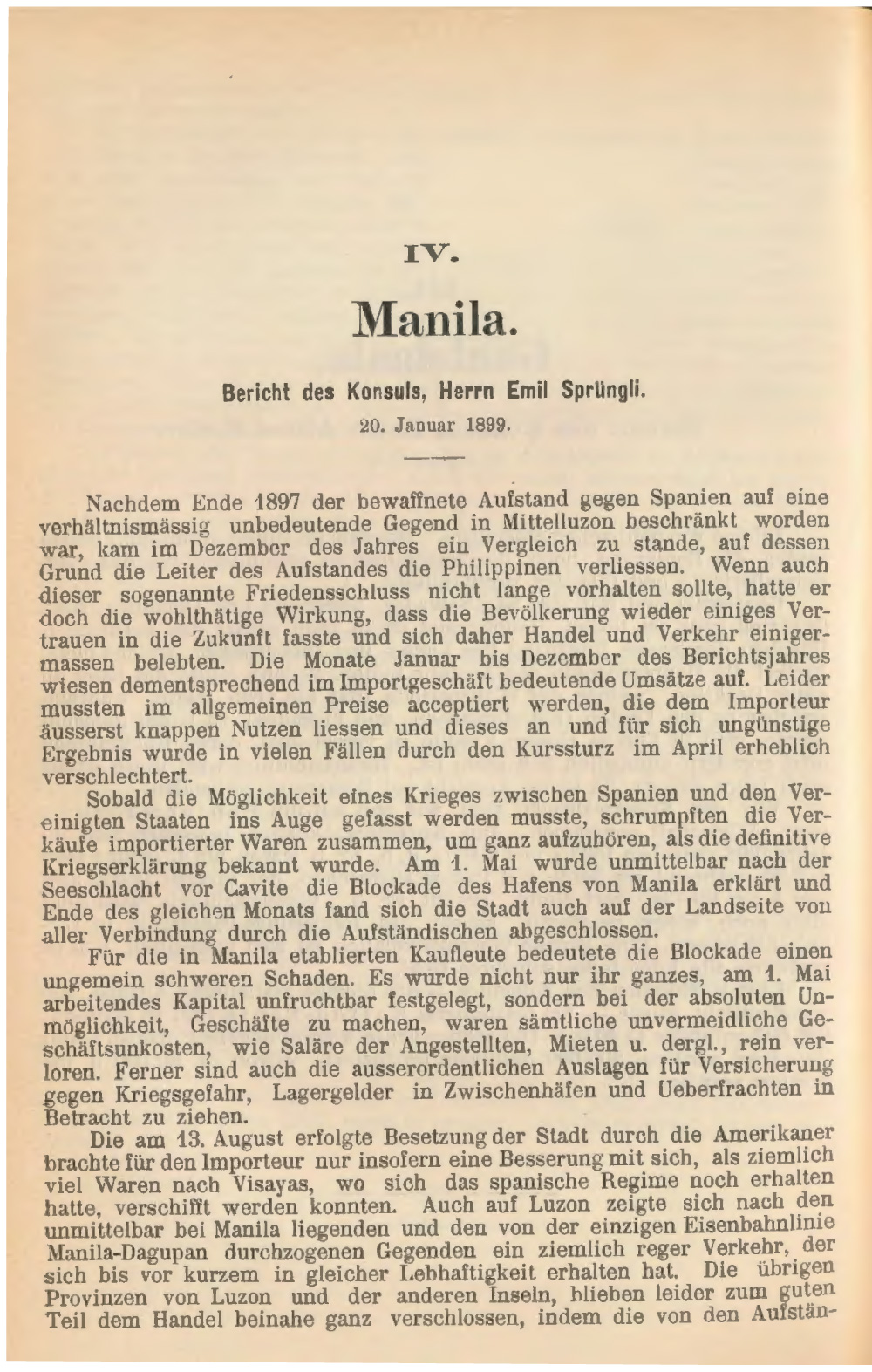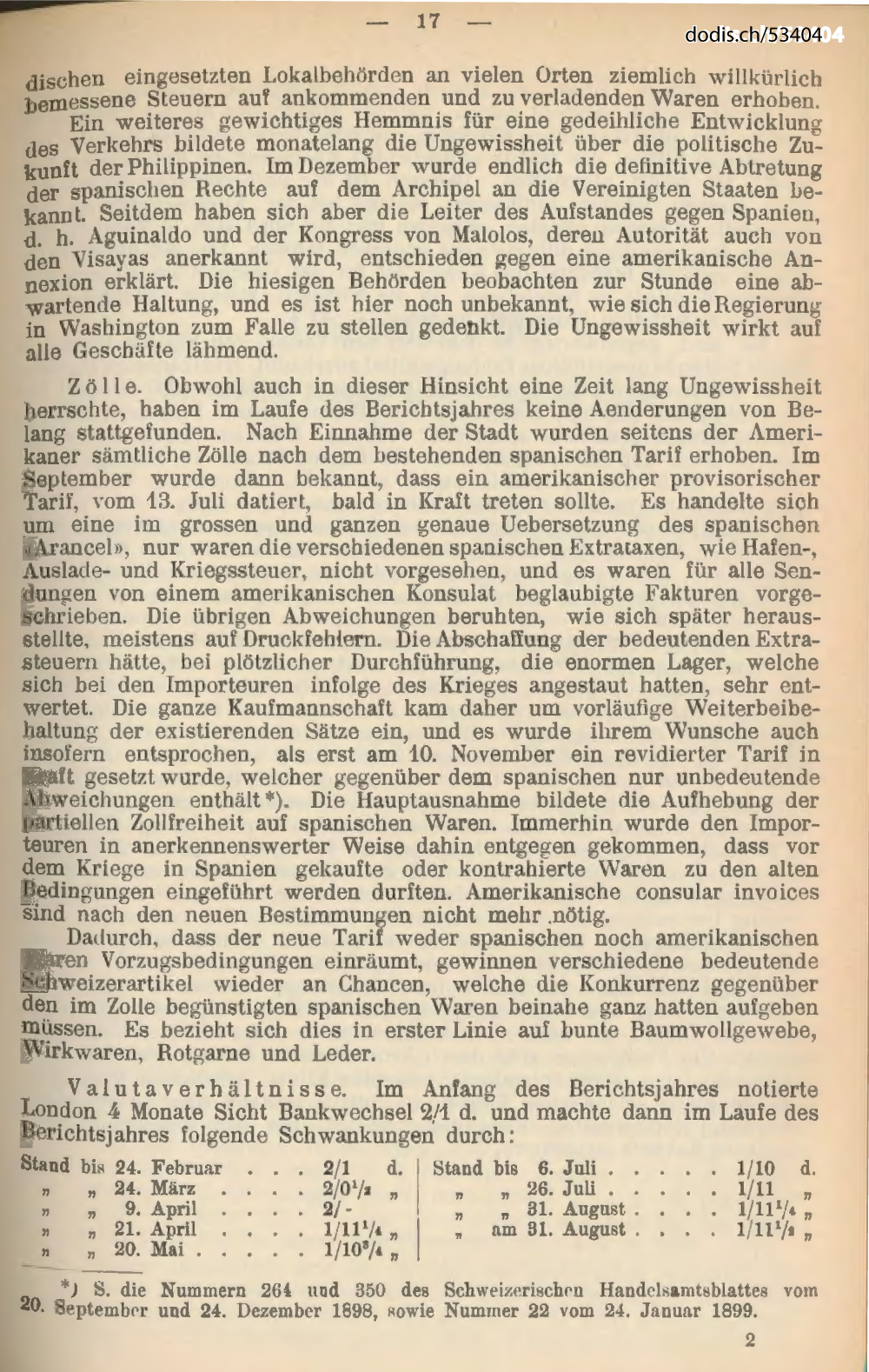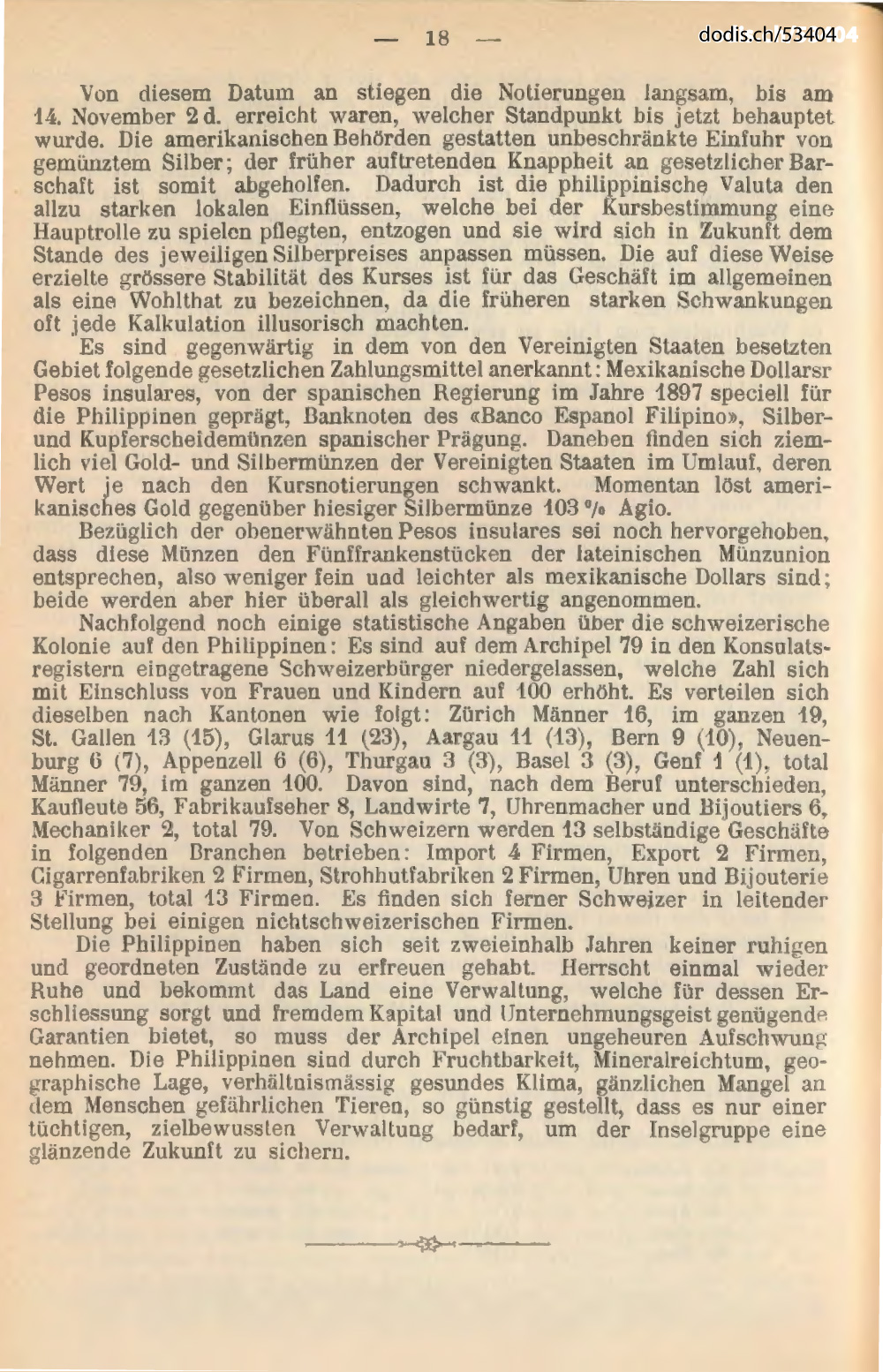Manila. Report of the Consul, Mr. Emil Sprüngli. January 20, 1899
From the Trade Reports of the Swiss Consulates (1893–1904), submitted by Sprüngli, Emil (1851–1910), the honorary Swiss consul to the Philippines from 1882–1910. The text has been translated from German by Stephanie Willi. Source: The Diplomatic Documents of Switzerland (Dodis) https://dodis.ch/P20525?lang=en
V.
Manila.
Report of the Consul, Mr. Emil Sprüngli.
January 20, 1899.
After the armed rebellion against Spain had been confined to a relatively insignificant area in Central Luzon, a settlement was reached in December of that year, on the basis of which the leaders of the rebellion left the Philippines. Although this so-called peace settlement was not to last long, it did have the beneficial effect of restoring some confidence in the future among the population, and thus revived trade and traffic to some extent. Accordingly, the months of January to December of the year under review saw significant sales in the import business. Unfortunately, in general prices had to be accepted, which left the importer with extremely scarce benefits, and this in itself unfavorable result was in many cases considerably worsened by the fall in exchange rates in April.
As soon as the possibility of a war between Spain and the United States had to be envisaged, sales of imported goods contracted, only to cease altogether when the definitive declaration of war became known. On May 1, immediately after the naval battle off Cavite, the blockade of the port of Manila was declared, and by the end of the same month, the city also found itself closed off on the land side from all communication by the insurgents.
For the merchants established in Manila, the blockade meant an immensely serious damage. Not only was all their capital working on May 1 laid up barren, but with the absolute impossibility of doing business, all unavoidable business expenses such as salaries of employees, rents, and the like, were purely lost. Furthermore, the extraordinary expenses for insurance against the danger of war, storage fees in intermediate ports and excess freight must also be taken into account.
The occupation of the city by the Americans on August 13 only brought an improvement for the importer only insofar as quite a lot of goods could be shipped to Visayas, where the Spanish regime had still survived. On Luzon, too, the areas immediately adjacent to Manila and those traversed by the single Manila-Dagupan railroad were the scene of fairly brisk traffic, which has maintained the same liveliness until recently. The remaining provinces of Luzon and the other islands, unfortunately, remain to a good almost completely closed to trade, as the local authorities appointed
by the insurgents levied rather arbitrary taxes on goods arriving and being shipped.
A further major obstacle to the prosperous development of traffic for months was the uncertainty about the political future of the Philippines. In December, the definitive cession of Spain's rights to the archipelago to the United States has been make known. Since then, however, the leaders of the rebellion against Spain,i.e., Aguinaldo and the Congress of Malolos, whose authority is also recognized by the Visayas, have declared their firm opposition to American annexation. The authorities here are currently observing a wait-and-see attitude, and it is still unknown how the government in Washington will deal with the case. The uncertainty has a paralyzing effect on all businesses.
Tariffs. Although uncertainty also prevailed in this respect for a while, during the course of the reporting period, there were no significant changes during the year under review. After the capture of the city, the Americans all duties were levied according to the existing Spanish tariff. In September, it became known that an American provisional tariff, dated July 13, was soon to go into effect. It was a largely accurate translation of the Spanish "arancel", except that the various Spanish extra taxes, such as port, unloading and war tax, were not provided for, and all shipments were to be certified by an American consulate. The other discrepancies were based, as it later turned out, mostly due to printing errors. The abolition of the significant extra taxes would, had it been implemented suddenly, have reduced the enormous inventories, which had accumulated at the importers as a result of the war, would have been greatly devalued. The entire merchant community therefore asked for the existing rates to be maintained for the time being, and their wish was granted insofar as a revised tariff was put into effect only on November 10, which contained only insignificant deviations from the Spanish one*).
The main exception was the abolition of the partial exemption from customs duties on Spanish goods. Nevertheless, the importers were accommodated to the extent that goods purchased or contracted in Spain before the war could be imported under the old conditions. American consular invoices are no longer required under the new regulations. The fact that the new tariff does not grant either Spanish or American goods any clear preferential conditions, various important Swiss articles, which had had to give up almost all competition to the Spanish goods favored in the tariff, are regaining their chances.
This refers primarily to colored cotton fabrics, knitted goods, red yarns and leather. Exchange rates. At the beginning of the year under review, London quoted 4 months' sight bank bills 2/1 d. and then underwent the following fluctuations in the course of the year under review: […]
*) See numbers 264 and 350 of the Swiss Official Gazette of Commerce
of September 20 and December 24, 1898, and number 22 of January 24, 1899.
From this date, quotations rose slowly until on November 14, 2 d. were reached, which position has been maintained until now. The American authorities permit unrestricted importation of coined silver; the scarcity of legal tender which formerly occurred has thus been remedied. Thus, the Philippine value is removed from the all too strong local influences, which used to play a principal part in determining the rate, and it will have to adjust itself in the future to the state of the prevailing price of silver.
The greater stability of the price achieved in this way is a boon for the business in general, since the earlier strong fluctuations often made any calculation illusory. At present, the following legal tender is recognized in the territory occupied by the United States: Mexican dollars pesos insulares, minted by the Spanish government in 1897 especially for the Philippines, banknotes of the "Banco Espanol Filipino", silver and copper shekels of Spanish coinage. Besides, there are quite a lot of gold and silver coins of the United States in circulation, whose value fluctuates according to the quotations. At the moment, American gold is currently selling at a premium of 103% Agio over local silver coins.
With regard to the above-mentioned pesos insulares, it should be pointed out that these coins have the same value as the five-franc pieces of the Latin coin union so they are less fine and lighter than Mexican dollars; both are, however, assumed to be equivalent everywhere here.
The following is some statistical information about the Swiss colony in the Philippines: There are 79 Swiss citizens registered in the consular registers in the archipelago, which number increases to 100 with the inclusion of women and children. They are distributed by cantons as follows: Zurich men 16, in total 19, St. Gallen 13 (15), Glarus 11 (23), Aargau 11 (13), Bern 9 (10), Neuchâtel 6 17), Appenzell 6 (6), Thurgau 3 (3), Basel 3 (3), Geneva 1 (1) total men 79, in total 100. Of these, according to profession, merchants 56, factory workers 8, farmers 7, watchmakers and bijoutiers 6, mechanics 2, total 79. 13 independent businesses are operated by Swiss in the following industries: Import 4 companies, export 2 companies, cigar factories 2 companies, straw hat factories 2 companies, watches and costume jewelry 3 companies, total 13 companies. There are also Swiss in leading positions in some non-Swiss companies.
For two and a half years, the Philippines have not enjoyed calm and orderly conditions. Once tranquility is restored and the country is given an administration that ensures its development and provides sufficient guarantees for foreign capital and enterprise, the archipelago must experience a tremendous upswing. The Philippines are so favorably placed by fertility, mineral wealth, geographic location, relatively healthy climate, complete lack of animals dangerous to man, that only an efficient, purposeful administration is needed to secure a brilliant future for the archipelago.
Translated from German, May 2023, Stephanie Willi
